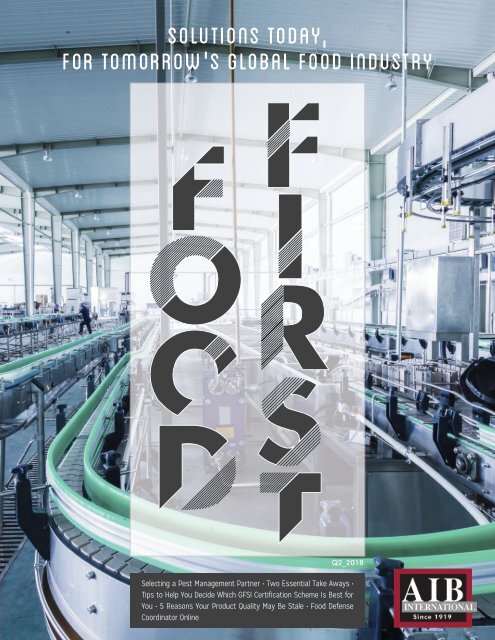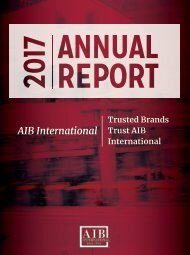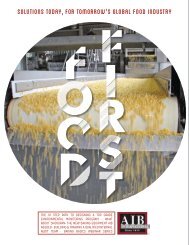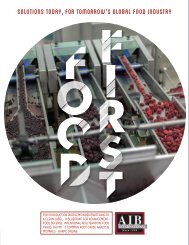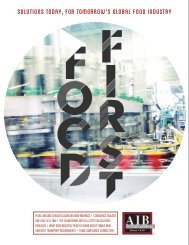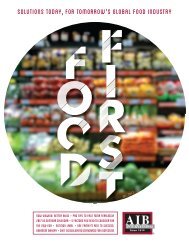AIB Q2 2018 Magalog
You also want an ePaper? Increase the reach of your titles
YUMPU automatically turns print PDFs into web optimized ePapers that Google loves.
SOLUTIONS TODAY,<br />
FOR TOMORROW’'S GLOBAL FOOD INDUSTRY<br />
<strong>Q2</strong>_<strong>2018</strong><br />
Selecting a Pest Management Partner • Two Essential Take Aways •<br />
Tips to Help You Decide Which GFSI Certification Scheme Is Best for<br />
You • 5 Reasons Your Product Quality May Be Stale • Food Defense<br />
Coordinator Online
Pest presence in any food environment is unacceptable. An<br />
effective integrated pest management (IPM) program will<br />
help ensure you have a safe food product. When selecting a<br />
pest control company you should be proactive to guarantee<br />
the service provider meets your company’s specific needs.<br />
That means doing your homework and asking the right<br />
questions before signing a contract and following-up<br />
regularly to ensure the program is working. Before you dive<br />
in, consider these questions.<br />
What kinds of licenses does the company have<br />
and how long has it been licensed?<br />
• Is the company and its pest control applicators in<br />
good standing with the government agency overseeing<br />
licensure?<br />
• Have any complaints been filed against the company or its<br />
employees?<br />
Who is doing the assessment?<br />
• Do they understand pest biology?<br />
• Are they evaluating the facility and its surroundings to<br />
determine if there is additional pressure?<br />
• Are they looking at building structure and condition to<br />
determine harborage areas?<br />
• Do they understand the products produced and the insect<br />
species associated with the product?<br />
• Are they looking at seasonal issues? For example, the<br />
site may be next to an agricultural field, where increased<br />
pressure may be on your facility after the harvest is<br />
complete and the external food source eliminated.<br />
Could the site benefit from additional monitoring<br />
tools such as the use of pheromone traps?<br />
• What are the issues identified on the service reports and is<br />
the site taking corrective action to address these?<br />
• Are the corrective actions effective?<br />
• What is the monitoring device documentation telling you?<br />
• Are more or less devices needed?<br />
• Where are devices placed?<br />
• How often are devices checked, replaced, and/or<br />
removed?<br />
• Are there enough devices being placed to eradicate the<br />
problem?<br />
Selecting a Pest<br />
Management Partner<br />
Questions to ask companies you’re considering doing business with<br />
Does the company have organic certification?<br />
• If yes, which organization is it certified through?<br />
• Do they service other organic facilities? If yes, how many?<br />
• How many technicians are trained to service organic<br />
facilities?<br />
• Do they offer training to your staff?<br />
Ask how your pest control company stays<br />
updated on current events and changes in pest<br />
control regulations.<br />
• Are they affiliated with trade organizations such as the<br />
National Pest Management Association (NPMA) or the<br />
National Pest Technicians Association (NPTA)?<br />
• If they are located in Europe are they members of the<br />
Confederation of European Pest Management Associations<br />
(CEPA)?<br />
• Do they participate in state or local associations that<br />
provide training and updates?<br />
Pest Management, <strong>AIB</strong> International - 2<br />
• Do they receive agricultural extension bulletins?<br />
• Do they make use of university or other programs to<br />
enhance their skills and training?<br />
Regardless of your company’s size, you should have an<br />
active and effective pest control program in place to ensure<br />
a safe food product free from harmful bacteria. The pest<br />
control company must be properly licensed and insured<br />
where applicable. You should carefully select your pest<br />
control provider and be certain they understand the nature<br />
of your specific business and the kinds of pests you are most<br />
likely to encounter in your facilities. Once an IPM Program<br />
is in place you should carefully manage it for effectiveness.<br />
That means meeting with your pest control service provider<br />
regularly to ensure the program is working.<br />
Discover more recommendations in our<br />
free download<br />
Selecting a Pest Management Partner<br />
tiny.cc/<strong>2018</strong>q1m1
The 2 Essential Take-Aways From <strong>AIB</strong>’s<br />
Management Development for the Food Safety/<br />
Sanitation Professional Resident Course<br />
According to Mount Franklin Foods’ David Barrios<br />
From the idea that pots and kettles will not be washed<br />
within twenty feet from a well to unclean laundry water<br />
shall not be discarded in the street, sanitarian’s have used<br />
guiding principles in the United States since Virginia’s<br />
first sanitation law in 1610. The advantages of having<br />
guidelines and standards in today’s food production<br />
facilities are easy to see: cleaning validation, foreign<br />
material control, and chemical control, to name a few.<br />
There are more benefits, though, according to Mount<br />
Franklin Foods Sanitation Supervisor David Barrios.<br />
Barrios attended <strong>AIB</strong> International’s three-week<br />
Management Development for the Food Safety/Sanitation<br />
Professional course in Spring 2017 at the recommendation<br />
of his employer.<br />
“I was excited to attend <strong>AIB</strong> last year, because of<br />
what the course provided.” Barrios said. “I want<br />
to learn from the best to make my plant the best.<br />
The hands-on experience was spot on for what to<br />
look for when working in the sanitation field.”<br />
Barrios said his path to becoming a sanitation supervisor<br />
has been less conventional than normal. After serving 12<br />
years in the US military, five of those in public health, he<br />
wanted to understand the civilian side of food inspection<br />
and sanitation. He also had a desire to improve his<br />
company’s sanitation program. This lead to a search for<br />
a training program entirely focused on sanitation. Since<br />
Barrios said the <strong>AIB</strong> course ultimately gave him the extra<br />
time to devote to productivity and distractions from the<br />
plant, it was important to reconnect, a year later, to see<br />
how he continued using his gained skills.<br />
<strong>AIB</strong>: How has the course changed<br />
your career?<br />
David Barrios: My view on sanitation has broadened.<br />
I now view it as a broad program that encompasses the<br />
whole plant, not just a single department. It was important<br />
to me to evolve and it’s a great feeling when you tell an<br />
auditor --- I’ve attended the <strong>AIB</strong> Management Development<br />
course. I’ve developed an understanding of the auditor<br />
language now and I feel confident enough to speak it.<br />
<strong>AIB</strong>: Was the course exactly what you expected?<br />
If not, what surprised you?<br />
David Barrios: The course was exactly what I expected and I was excited<br />
knowing I was walking into a distraction-free zone, away from the plant<br />
responsibilities that constantly take my time. This course was a time-saver<br />
because it gave me the tools necessary to start a sanitation program from<br />
scratch, something I didn’t want to do on my own. It also taught me about<br />
how to implement wash schedules and know what to look for.<br />
One of the most frequently heard pain points in off-site training is taking<br />
time away from plant obligations. <strong>AIB</strong> General Manager of Food Safety<br />
Services Gary Burgess helps students see the value of the course.<br />
“I know it’s difficult to be away from your plant for an extended<br />
amount of time.” Burgess said. “However, the knowledge and<br />
real-world experience gained from this in-depth course will pay<br />
off immeasurably.”<br />
<strong>AIB</strong>’s Management Development for the Food Safety/Sanitation Professional<br />
course is taught by food safety professionals who have years of hands-on<br />
experience in the food industry. The course is a mixture of both classroom<br />
and on-the-floor training. The biggest advantage is the instructor’s ability<br />
take participants to the on-site pilot plant to apply the principles learned in a<br />
practical manner. <strong>AIB</strong>’s comprehensive course develops skills in the following<br />
areas:<br />
• Food Regulations/<br />
Regulatory Inspections<br />
• Developing and<br />
Implementing an<br />
Effective Sanitation<br />
Program<br />
• Prerequisite Programs<br />
• Cleaning Procedure<br />
Development<br />
• Allergen Control<br />
• Chemical Control<br />
• Personnel Practices<br />
• Effective Inspection<br />
Techniques<br />
• Bacteria, Mold and<br />
Viruses<br />
• Swabbing<br />
• Foreign Material<br />
Control<br />
• Sanitary Design<br />
• Maintenance for Food<br />
Safety<br />
• Microbial Risk<br />
Assessments<br />
• Food Defense<br />
• Integrated Pest<br />
Management<br />
• HACCP<br />
• Managing for Better<br />
Returns<br />
Management Development for the Food Safety/Sanitation Professional<br />
April 30 - May 18 • Manhattan, KS<br />
All-in-one management training for your plant’s future leaders<br />
tiny.cc/<strong>2018</strong>q1m4<br />
Management Development Graduate, <strong>AIB</strong> International - 3
US <strong>2018</strong> Seminar Calendar<br />
Enroll today!<br />
tiny.cc/<strong>2018</strong>q1m2<br />
April<br />
May<br />
June<br />
July<br />
August<br />
FSPCA Preventive<br />
Controls for Human<br />
Food and HACCP<br />
Integration for FMSA<br />
Compliance<br />
10-12<br />
FSPCA Preventive<br />
Controls for Human<br />
Food and HACCP<br />
Integration for FMSA<br />
Compliance<br />
17-19<br />
FSPCA Preventive<br />
Controls for Human<br />
Food and HACCP<br />
Integration for FMSA<br />
Compliance<br />
1-3<br />
Foundations:<br />
Ingredient Testing<br />
Techniques<br />
4-7<br />
Manhattan, KS<br />
FSPCA Preventive<br />
Controls for Human<br />
Food and HACCP<br />
Integration for FMSA<br />
Compliance<br />
12-14<br />
Foundations: Batter<br />
Cakes<br />
16-20<br />
Manhattan, KS<br />
FSPCA Preventive<br />
Controls for Human<br />
Food and HACCP<br />
Integration for FMSA<br />
Compliance<br />
7-9<br />
Charlotte, NC<br />
Foundations:<br />
Labeling of FDA<br />
Regulated Foods<br />
10-11<br />
Chicago, IL<br />
Certified Equipment<br />
Design for BISSC<br />
Certification<br />
17-18<br />
Chicago, IL<br />
Food Defense<br />
Coordinator<br />
24-25<br />
Phoenix, AZ<br />
Management<br />
Development<br />
for the Food<br />
Safety/Sanitation<br />
Professional<br />
Philadelphia, PA<br />
HACCP Workshop<br />
8-9<br />
Kansas City, MO<br />
Food Defense<br />
Coordinator<br />
15-16<br />
Chicago, IL<br />
Foundations:<br />
Cookies and<br />
Crackers<br />
4-7<br />
Manhattan, KS<br />
FSPCA Foreign<br />
Supplier Verification<br />
Programs<br />
5-6<br />
Orlando, FL<br />
Portland, OR<br />
Applications:<br />
Cracker<br />
Troubleshooting<br />
18-22<br />
Manhattan, KS<br />
Food Safety &<br />
Sanitation for Food<br />
Plants<br />
26-29<br />
FSPCA Preventive<br />
Controls for Human<br />
Food and HACCP<br />
Integration for FMSA<br />
Compliance<br />
17-19<br />
Kansas City, MO<br />
Food Defense<br />
Coordinator<br />
24-25<br />
Charlotte, NC<br />
Chicago, IL<br />
Food Defense<br />
Coordinator<br />
14-15<br />
Philadelphia, PA<br />
HACCP Workshop<br />
21-22<br />
Portland, OR<br />
Manhattan, KS<br />
Specializations:<br />
Tortilla<br />
17-20<br />
Manhattan, KS<br />
30-May 18<br />
Manhattan, KS<br />
Specializations:<br />
Advanced Labeling<br />
of FDA Regulated<br />
Foods<br />
15-16<br />
Chicago, IL<br />
Applications: Cookie<br />
Troubleshooting<br />
11-15<br />
Manhattan, KS<br />
Manhattan, KS<br />
Baking Science and<br />
Technology<br />
22-December 14<br />
Manhattan, KS<br />
Calendar, <strong>AIB</strong> International - 4 Calendar, <strong>AIB</strong> International - 5
09<br />
Tips to Help You Decide Which GFSI<br />
Certification Scheme is Best for You<br />
Selecting a certification standard is an important step for any organization. You are choosing the rules the organization<br />
will need to comply with and in some ways, the standard will shape the food safety culture of your organization. Many<br />
companies change standards after discovering their initial choice was not a good fit for their company, that customer<br />
expectations have changed, or that there is a change in their food safety culture.<br />
A thorough decision results in better preparedness, clarity about what is required, and an indication of the steps to follow.<br />
It is important to understand the main components of a GFSI standard as each is different. All GFSI standards have three<br />
core components: HACCP, prerequisite programs, and management system requirements. Before selecting the standard<br />
that is right for your facility, read and review each option and any supporting information. Consider each of these aspects<br />
during your selection process to pick a scheme that best meets your needs.<br />
1. Customer Requirements<br />
Discuss your main customers’ needs and expectations. Your main<br />
customers may have good insights and be able to share their<br />
implementation experience and pitfalls in the process. Depending on who<br />
your main customers are, there could be specific needs and expectations.<br />
2. Alignment With FSMA<br />
Food companies in the United States and those importing to the US need<br />
to be in compliance with customer and legal requirements. It is important<br />
to understand how the standard you select aligns with the FDA’s Food<br />
Safety Modernization Act (FSMA). Although GFSI does not 100 percent<br />
comply with FSMA requirements, it does highly support the effort to<br />
become compliant. Determine how selected standards meet, exceed, or fall<br />
short of FSMA requirements to help you understand what extra work will<br />
be required to attain compliance.<br />
3. Time to Implement Corrective Actions<br />
After the audit, your organization is allotted time to implement corrective<br />
actions over identified deviations. Some of those deviations will take time<br />
and money. The standard you choose will determine the implementation<br />
time frame. In all cases, there must be evidence that immediate actions<br />
are taken to control non-conformities. It is important to ensure your<br />
organization meets required timeline commitments. If corrective actions<br />
are not demonstrated, you will more than likely receive a major deviation<br />
that increases your chances of certificate suspension.<br />
4. Location and Availability of Qualified Auditors<br />
All GFSI standards are globally accepted, but there are different<br />
concentrations of available auditors. While some standards are widely<br />
used in certain regions, in others it can be a challenge to find auditors in<br />
the area. Similarly, all standards categorize food products differently and<br />
in some cases products fit in a very specific category where only few<br />
auditors are approved to audit them.<br />
5. Length of Audits<br />
Every standard has a method to determine the amount of time used to<br />
execute the audit. The main parameters usually include the number of<br />
employees, the number of HACCP groups (or product groups), and size of<br />
the facility. Other factors may include the number of production lines or<br />
type of manufacturing processes.<br />
GFSI, <strong>AIB</strong> International<br />
6<br />
6. Scope of Activities Food Safety vs. Food Safety-Quality<br />
Among all GFSI standards the common ground is food safety.<br />
Quality program requirements are also included in some<br />
standards. While some organizations consider both are relevant<br />
and important, others believe that compliance complicates the<br />
process and may place risks on their initial efforts. Additionally,<br />
some organizations have complex and well-defined quality<br />
standards that are not a good fit with an externally developed<br />
standard.<br />
7. Audit Frequency<br />
All GFSI standards require annual audits. At each audit, it<br />
is required that compliance with all applicable clauses is<br />
evaluated. What is not mandated by GFSI are the actions for low<br />
performance. Keep this consideration in mind as the frequency<br />
may affect your audit budget.<br />
8. Unannounced Audits<br />
In an effort to ensure audits capture a company’s performance<br />
in normal conditions and increase their level of compliance at<br />
all times, GFSI requires that all standards provide the option to<br />
receive unannounced audits. These differences in standards may<br />
conflict with customer requirements. Confirm your customers’<br />
expectations early in your selection process, as some retailers<br />
require unannounced audits by default.<br />
9. Bundle of Requirements<br />
Food safety compliance is more than likely the main interest<br />
of your company and your customers. There are other topics<br />
that may be of concern for you or your customers including:<br />
sustainability, gluten-free, trade of products, organic, animal<br />
feed, FSMA readiness, etc. Some standards have been structured<br />
to meet food safety/quality but nothing else, while others may<br />
allow you to cover multiple needs in the same visit to reduce<br />
costs and meet several customer or internal needs in a single<br />
visit.<br />
For additional questions or details about standard<br />
requirements, contact <strong>AIB</strong>I Certification Services, a<br />
separate organization and auditing partner of <strong>AIB</strong><br />
International, at gfsi@aibonline.org.
5 Reasons<br />
Your Product<br />
Quality May<br />
Be Stale<br />
We’ve all experienced stale<br />
cookies, crackers, and bread<br />
that have lingered a little too<br />
long in our pantries. But what<br />
happens when those products<br />
stale before what’s reasonably<br />
acceptable? Discover 5<br />
common reasons why your<br />
product quality may be stale.<br />
5<br />
Discover more essential baking tips in<br />
<strong>AIB</strong>’s week-long Foundations: All About<br />
Baking course. Explore key baking<br />
equipment, learn essential production<br />
steps, and be able to use ingredients<br />
and methods common in today’s<br />
bakeries to produce pan and hearth<br />
breads, tortillas, cakes, cinnamon rolls,<br />
and doughnuts.<br />
1. Overbaked<br />
Check the internal temperature of product exiting<br />
the oven. An oven thermal profiler may be needed to<br />
determine that 200˚F (93°C) is achieved with only 15%<br />
of bake time remaining.<br />
2. Cooled too long<br />
Check the internal temperature in the wrapping<br />
room. If not cool enough, cooling time may need to be<br />
extended.<br />
3. Under absorbed<br />
Check that cleanup time is on target for optimum<br />
absorption. If cleanup time is delayed, the dough is<br />
over absorbed. Cleaning up too quickly signals under<br />
absorption.<br />
4. Low softener/enzyme levels<br />
Verify that the amount of softeners/enzymes is<br />
correct.<br />
5. Not enough fat or oil<br />
Ensure that the fat/oil levels meet the standard. If oil<br />
is being metered to the mixer, calibrate the meter on a<br />
regular basis to ensure accuracy.<br />
“The All About Baking class is designed<br />
specifically for people who aren’t<br />
necessarily bakers, but need to know<br />
the basics to do their jobs better”, said<br />
Baking & Snack’s Matt Hamer. “With<br />
less than a year’s experience under my<br />
belt I was excited to jump in to this<br />
all extensive crash course. My biggest<br />
takeaway for the day was finally<br />
getting the full linear process of baking<br />
lined up for me – from the formulation<br />
stage all the way down to bagging.”<br />
Join the All About Baking<br />
fan club today!<br />
Foundations:<br />
All About Baking<br />
October 15-19<br />
Manhattan, Kansas<br />
REGISTER NOW!<br />
tiny.cc/<strong>2018</strong>q1m3<br />
All About Baking Feature, <strong>AIB</strong> International - 7
<strong>AIB</strong><br />
1213 Bakers Way, PO Box 3999<br />
Manhattan, KS 66505-3999<br />
NON PROFIT ORG<br />
US POSTAGE PAID<br />
AMERICAN<br />
PRE-SORT INC<br />
Food Defense<br />
Coordinator Online<br />
Brand new training to help you<br />
mitigate intentional adulteration.<br />
Challenge how you would mitigate intentional adulteration in<br />
your food plant! Learn how to design a comprehensive food<br />
defense plan that meets FDA’s newly-imposed regulations<br />
with our easy-to-navigate online training. This vital component<br />
of your food protection plan is required by government<br />
regulations, certification programs, and some customers.<br />
Enroll Today!<br />
tiny.cc/<strong>2018</strong>m6


